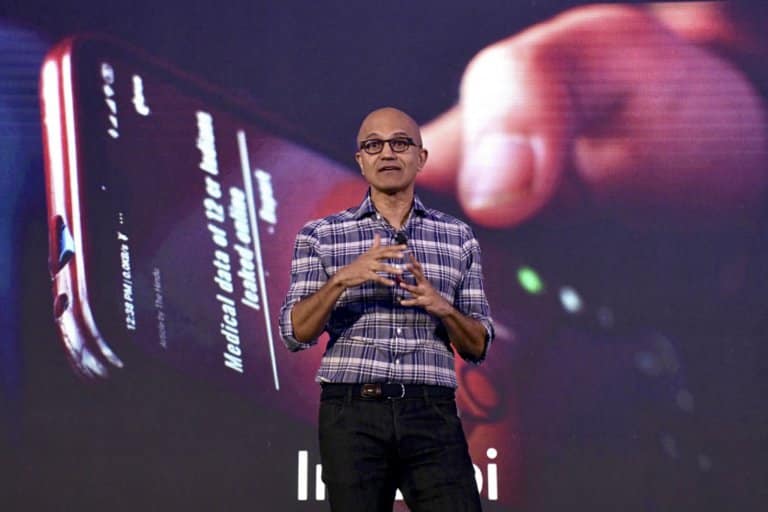
What do companies like Microsoft, Google and Adobe have in common?
They’re all led by Indian CEOs who studied in the US, namely Satya Nadella, Sundar Pichai and Shantanu Narayen.
It would be easy to say that it was their international education that made them the powerhouses they are.
But the answer is more complex than that. Not all Indian CEOs studied abroad and not all went to Ivy League unis. Some studied locally while others chose public US universities.
A few outliers did work their way to prestigious schools like Yale, Stanford and the University of Pennsylvania.
But it’s not just an American degree that catapulted them into the most powerful C-suites in the world.
What these Indian CEOs truly have in common, however, is a lesser-known fact: they were all part of India’s brain drain in the 1970s and 1980s.
The exodus of India’s best and brightest
Like any other country’s brain drain, it was caused by a lack of high-skilled jobs.
When India’s economy and politics tanked in the 1970s and 1980s, those with advanced degrees in engineering, medicine, and computer science found themselves jobless and severely underemployed.
Seeking better pay, opportunities and less corruption, they migrated to the US, UK and Canada. Many stayed, with India struggling to reverse the exodus of talent until today.
The country’s brain drain, especially for IT graduates, is estimated to account for as much as a US$2 million loss per annum, according to the 2001 Human Development Report of the United Nations Development Programme.
Adobe CEO Shantanu Narayen feels differently about the situation now.
“If I was growing up right now, there was no way I would be leaving Hyderabad. A lot of opportunity exists in Hyderabad and India,” he said while speaking at the TiE (The Indus Entrepreneurs) summit 2022 in Hyderabad.
What Narayen said offers further insight into what at first seems like an unlikely factor that makes Indian CEOs like him so successful: India itself.
India’s unique culture made Indian CEOs who they are today
Riddled with extreme poverty with little, if any, of the polished features of a first-world country, India at first glance does not look like the place where the next Steve Jobs can build the next Apple.
Yes, Narayan is right that there are many job opportunities in Hyderabad and India right now.
But before Bangalore became Asia’s Silicon Valley, there was another facet of India that played a role in making the Pichais, the Nadellas and the Narayans the richest Indian CEOs today.
It’s Indian culture — specifically how it’s traditional but still open and diverse. It’s their upbringing within a society that has for centuries been adaptable to new ideas and cultures.
This is a key ingredient for any innovator or leader — it allows them to know what it takes to connect with customers on a deeper level and to bring diverse viewpoints to the table.
Perhaps more importantly, it teaches them how to foster creativity and collaboration — without which they will not be able to build effective teams.
Alphabet — Google’s parent company — has close to 200,000 employees. Google runs seven products with over one billion users: Gmail, Chrome, Maps, Search, YouTube, Google Play Store and Android.
Pichai doesn’t manage all of this alone. He has teams of varying personalities and talents — each of which he needs to tap into their personal strengths.
Growing up in a country of over one billion Indians and with one of the most respected democracies in the world could teach you a thing or two about this
10 successful Indian CEOs working in the US
1. Satya Nadella

Satya Nadella holds two master’s degrees in computer science and business administration. Source: Jason Redmond/AFP
The current Microsoft Chairman and CEO studied electrical engineering degree at Mangalore University in 1988.
He received his master’s in computer science degree from the University of Wisconsin-Milwaukee two years later, before pursuing a second master’s degree in business administration from the University of Chicago in 1997.
2. Indra Nooyi

Indra Nooyi is the first female CEO of PepsiCo. Source: Mike Coppola/Getty Images North America/Getty Images via AFP
Among the most notable Indian CEOs today, Madras-born Indra Nooyi is not to be overlooked, being the first female CEO of PepsiCo.
Her most notable achievement during her 12 years of tenure? Growing PepsiCo’s sales by 80%.
After receiving her bachelor’s degree in chemistry from Madras Christian College in 1978, she earned a master’s degree in business administration from the Indian Institute of Management in Calcutta two years later.
After moving to the US, she earned an additional master’s degree in public and private management from the Yale School of Management.
3. Sundar Pichai

Sundar Pichai went to the US to pursue a master’s degrees in materials science and engineering and his MBA. Source: Jerod Harris/Getty Images North America/Getty Images via AFP
Coming from a humble background, Pichai Sundararajan (better known as Sundar Pichai) is the current CEO of Google and Alphabet.
He has always been a bright student, which granted him opportunities to study at top-ranked educational institutions abroad.
After earning his degree in metallurgical engineering from IIT Kharagpur in 1993, he left for the US to pursue an MS in Materials Science and Engineering from Stanford in 1995.
Two years later, he received his MBA from the Wharton School of the University of Pennsylvania.
He was named a Siebel Scholar and a Palmer Scholar during his time there, respectively.
4. Shantanu Narayen
Similar to Nadella, Shantanu Narayen also holds a bachelor’s degree in electronics engineering from Osmania University and two master’s degrees – computer science from Bowling Green State University and business administration from the University of California at Berkeley’s Haas School of Business.
Since becoming CEO of Adobe, the company has achieved record revenue and industry recognition for its inclusive, innovative and exceptional workplace, including being continuously named a Great Place to Work and Fortune’s 100 best companies to work for.
5. Nikesh Arora
Nikesh Arora is the chairman and CEO of Palo Alto Networks, the leading cybersecurity company in the world. Under his leadership, Palo Alto Networks received the top ranking on Newsweek’s 100 Most Loved Workplaces in 2022.
After completing a B. Tech. in electrical engineering from the Institute of Technology at Banaras Hindu University, he moved to the US in 1999 where he completed an MBA at Northeastern University and earned an MS in Finance from Boston College.
6. Anshu Jain

Anshu Jain is the first non-European to lead the Deutsche Bank. Source: Daniel Rolamd/AFP
Jaipur-born Anshu Jain moved to the US when he was 20 after he completed his economics degree at Shri Ram College of Commerce at the University of Delhi.
He then earned an MBA in finance from the School of Management at the University of Massachusetts Amherst and studied there with Thomas Schneeweis, an expert in alternative investments.
Jain started his career at Wall Street and was appointed to Deutsche Bank’s Management Board in 2009 and was responsible for the Corporate and Investment Bank division from 2010. From 2012 to 2015, he was Co-CEO.
He was the first non-European to lead the German institution — which made him one of the more notable Indian CEOs before he passed away of cancer in 2017.
7. Ivan Menezes
Ivan Menezes is the CEO of Diageo, a British multinational alcoholic beverage company.
Prior to his career with Diageo, Ivan worked across a variety of sales, marketing and strategy roles for Whirlpool in Europe, Booz Allen & Hamilton in North America, and Nestlé in Asia.
Ivan holds an MBA from Northwestern University’s Kellogg School of Management, a postgraduate degree from the Indian Institute of Management, Ahmedabad and an economics degree from Delhi University.
Menezes will be stepping down from his position this June.
8. Sanjay Jha

Sanjay Jha has a bachelor’s degree and PhD in electrical engineering. Source: Ethan Miller/Getty Images North America/Getty Images via AFP
Former Motorola CEO Sanjay Jha began his career at Qualcomm as a senior engineer where he eventually became executive vice president and president of Qualcomm.
Three years later, he was appointed COO in December 2006. He became the CEO for the Motorola Mobile Devices business in 2008.
Jha has a bachelor’s in electrical engineering from the University of Liverpool and a PhD in electronics engineering from the University of Strathclyde.
9. Chanda Kochhar
When Chanda Kochhar became the CEO of ICICI Bank, she led its expansion and diversification into areas such as retail banking and wealth management.
Before that, she pursued a bachelor’s degree in Arts from Mumbai’s Jai Hind College and an MBA at Mumbai’s Jamnalal Bajaj Institute of Management Studies.
She then went to Harvard Business School to join the Advanced Management Programme.
The programme is targeted towards business leaders who are “one or two levels from the CEO in large organisations and have been identified as central to the company’s succession plan.”
It is also ideal for C-suite executives at midsize companies with significant growth opportunities and senior executives with at least 20 years of work experience
This includes members of executive committees, heads of major business units, senior heads of functions, and senior members of the operating group.
10. Shikha Sharma
Shikha Sharma is the former CEO of Axis Bank credited with transforming Axis Bank into one of the most innovative and customer-centric banks in India.
She holds a bachelor’s degree in economics from Lady Shri Ram College in India and an MBA from the Indian Institute of Management in Ahmedabad.
Like Kochhar, she is also a graduate of the Advanced Management Programme at Harvard Business School.










